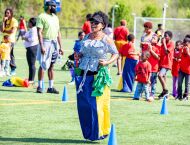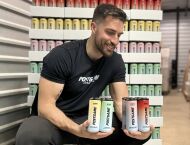Play

All Eyes on Rio: Local Rower Matt Miller Pulls for Gold in the Summer Games
August 1, 2016 @ 12:00am
The race begins in silence, the crisp reflections of perfectly aligned boats shimmering off of the water’s smooth surface. The world’s rowing community comes from far and wide to fill the stands, anxiously awaiting the nose-to-nose finishes that give nations new heroes.
For 27-year-old Matt Miller, his journey to the beautiful bays of Rio Di Janeiro began in Springfield, Va. The competitive redhead spent his childhood bouncing around between soccer, baseball and basketball before taking up football and rowing at West Springfield High School. Little did he know that the casual suggestion of a neighbor to pick up the oars would change his life forever.
After graduation, Miller headed to the University of Virginia to earn a degree in systems and information engineering, while also competing on the rowing team. Despite the program’s club status, Miller is one of five Cavalier alumni that will join current UVA Coach Kevin Sauer on the Olympic rowing team in Rio.
“It starts with an all-out sprint,” Miller says. “Everyone is taking strokes as hard as they can. Since everyone is facing the starting line, it is important to get out early and see where you are. Being behind is a dangerous place to be because your competitors can pull away without you knowing.”
Despite his athleticism and competitive fire, Miller began his international rowing career behind the pack, not knowing when his opportunity would come.
After college, Miller moved to DC, where he spent the early morning hours training rowers at the Potomac Boat Club, and then provided energy ratings and data analysis to DC Energy during office hours. That all changed when he received a call from USRowing Coach Luke McGee.
He joined McGee in January 2014, and made an instant splash, using his tall frame and smooth, long strokes to help propel the Americans to victory in his first international race, the 2014 World Cup II in France.
Using a GoPro and a soundtrack tune, Miller’s documentation of this momentous win became a social sensation, and his videos have since amassed over 150,000 views on YouTube, success he credits to the overwhelming support of the junior rowers.
“Eventually, you have to find a speed that is semi-sustainable. It’s a sprint the whole way, but it’s important to find the right speed for the second and third quarters of the race.”
For Miller, this strength and consistency has been refined through a very detailed training regimen. He wakes up at 5:30 a.m. to get out on the water for his daily 18-kilometer (12-mile) base training, which he explains is his favorite part of being a rower.
“The long training sessions of low intensity workouts can be so relaxing and peaceful,” he says. “You’re out in nature, the scenery is beautiful and the boat is moving quickly without much effort if you are rowing well.”
He will then eat a light lunch and prepare for afternoon practice, which consists of sprint training, twice-a-week weightlifting or personal speed timing on an indoor erg. Interestingly, Miller set an unofficial U.S. record for an erg sprint in the buildup to the Olympic games. While his duties with the national team will always trump any indoor competition, his team and coaching staff still credit him with the best time by an American rower.
The challenge facing Miller in Brazil is that he will be in the men’s four, an event he has competed in for just over a year, albeit a successful year that has seen his team finish first in the 2016 World Cup I in Italy, and fourth in the World Cup II in Switzerland.
“I am the newest guy to the boat,” Miller explains. “I have always been used to having a coxswain, but now we are out there on our own with one of the athletes giving us our strategic moves, so getting the additional experience has been really helpful.”
Two of Miller’s teammates, Henrik Rummel and Charlie Cole, were in the boat that won bronze at London 2012, the first men’s four medal for the Americans in 20 years. Seth Weil will round out the team, hoping to hop higher on the podium in Brazil.
“They give us great perspective,” Miller says of Rummel and Cole. “They know what to expect, and have helped us deal with the distractions of the Olympics, while staying focused on rowing.”
“At the end of the race, the ratings (strokes per minute) go up as you sprint to the line. You can feel the boat surge at the finish, and glide underneath you as you come up for the next stroke.”
Miller’s next competitive strokes will undoubtedly be the biggest of his career. While recent reports have surfaced questioning the health concerns of the water in Rio, the ultra-competitive UVA grad never even considered missing the race he has spent his whole life trying to reach.
“Racing can be very painful if you focus on how much your muscles hurt,” Miller admits. “But it can also be a thrilling, adrenaline rush experience if you love to compete.”
When the rush and the pain fade, Miller is looking forward to exploring the beaches of Brazil, then returning to Charlottesville with his wife and earning his master’s degree from UVA’s Darden School of Business.
To learn more about Matt Miller and the rest of the USRowing team, go towww.usrowing.org.







